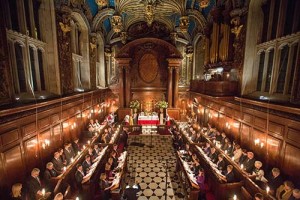Evensong, Chapel Royal, Hampton Court Palace
The Synod on the Family raised the vexed issue of the reception of communion by those Catholics who have civilly divorced and civilly remarried. Some cardinals propose allowing such people to receive communion. I (and apparently most theologians) think this is impossible, given the Catholic understanding of the indissolubility of a sacramental marriage. The Orthodox and conservative Protestants believe that divorce is wrong, but that a sacramental marriage can be dissolved. I am not sure if the indissolubility of a sacramental marriage has ever been solemnly defined, but it is certainly part of the ordinary teaching of the Church, and any reconsideration should be done by an ecumenical council, not be a cabal of manipulative German cardinals.
Given that, everyone knows about matrimonial disasters among friends and family. I think a neglected question is whether people really intended to enter into an indissoluble marriage. They may say so, but their actions later may indicate they did not. I believe until the 1917 Code of Canon Law, people with marital problems consulted their parish priest about whether their marriage was indeed valid. Now it is a matter for complicated canonical procedures. I am not sure that that is an improvement. I think one must ordinarily presume the good faith of a Catholic who believes, after consultation, that his or her first marriage was not valid and that he or she is free to enter into a sacramental marriage. I know canonists would disagree, but canon law should serve the salvation of souls, not be a self-contained legal system which strives for coherence and consistency above all.
Nonetheless, there would be many cases of people whose first marriages were valid and who have entered into another union from which they cannot extricate themselves without doing grave harm to others, especially children. They cannot receive communion, because they are objectively in an irregular and sinful state. However, they may want to maintain a connection with the Church, especially for their children’s sake.
The growing problem of irregular marriages has combined with the increased emphasis since the time of Pius X on frequent reception of communion. The Eucharist is seen as the summit of Catholic life and worship; with the general abandonment of popular devotions, it is usually the only communal gathering of Catholics. The mitigation and indeed practical abandonment of fasting and the almost complete neglect of the sacrament of Penance means that almost everyone goes to communion, except for those in civil marriages, who feel acutely left out. Tightening up the requirements for the reception of communion by re-imposing a more serious fast and stressing the need for confession would help; but it is always harder to tighten than to loosen discipline.
In addition to those in irregular marriages there are many people who want to have a connection with the Church but aren’t ready to take on the full discipline necessary for a worthy communion.
Catholics have forgotten that the Liturgy of the Hours is also part of the public worship of the Church. If Catholic churches would imitate the Anglican custom of sung Morning or Evening Prayer (and Vespers used to be common in parishes), and if the Church would allow attendance at such services to fulfill the Sunday obligation, a lot of problems could be avoided. In England church attendance is plummeting; but attendance at choral Morning and Evening Prayer in cathedrals in increasing. Here is Pope Benedict at Westminster Abbey Anglican Evening Prayer.
Anyway, just a suggestion.
